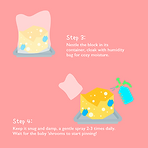

MushRoommate
An At-Home Seasonal Mushroom Growing Experience
A sustainable indoor-growing system that empowers users to cultivate edible mushrooms year-round through a seamless integration of physical packaging, digital guidance, and community support.
Role:
UI UX Designer & Product Strategist
Highlights:
-
UX Research
-
Service Design
-
UI Design
-
Product Strategy
-
Prototyping
-
Packaging Design
Background
Canada’s rising vegetable prices and short growing seasons have made fresh produce harder to access, especially during the winter months. (*As shown in the chart on the right, even staple vegetables like potatoes and tomatoes have seen steady price increases in recent years.* )
This inspired me to explore a sustainable, home-based alternative — growing mushrooms indoors.

Potatoes and Tomatoes: Analyzing Canada's Popular Vegetables (2019-2023)
Problem & Opportunity
Problem
Fresh produce in Canada is expensive and often imported due to short growing seasons and high transportation costs.
Existing home-growing kits are complex, energy-intensive, and not sustainable for everyday users.
Opportunity
As sustainability and mindful living become mainstream, there’s potential for a low-maintenance indoor system that reconnects people with nature. Mushrooms — compact, fast-growing, and resource-efficient — offer a practical starting point for this experience.
Research & Insights
Research Methods
To uncover users’ perceptions and challenges around mushroom cultivation, I conducted both first-hand research (interviews and focus groups) and secondary research (literature and market analysis).
The following visuals summarize key findings from each stage.



Synthesis
From both user and market research, three key insights emerged:
01
People lack accurate knowledge and confidence about mushroom cultivation.
02
Existing resources about mushroom growing are inconsistent, overly detailed, and difficult for beginners
to follow.
03
Highlighting the emotional and ecological value of mushroom growing can encourage adoption.

HOW MIGHT WE reimagine home mushroom cultivation as a simple, engaging, and cost-effective way to access fresh food year-round?
User Persona
From the research, two key user types emerged — urban residents who want to live more sustainably but face different environmental and lifestyle barriers. These personas guided the design focus on accessibility, seasonality, and motivation.
Primary Persona - Dedicated Home Gardener

Secondary Persona - Efficiency-driven student

Emma’s needs and frustrations became the foundation for identifying opportunities to design a simple, year-round indoor growing experience.
User Mindset Map
How the product experience supports Emma’s needs across her growing journey.

From Emma’s mindset and emotional journey, several key design opportunities emerged
— guiding how the product and service could better support her home-growing experience.
Design Opportunities
From Emma’s journey, three key design opportunities emerged — each addressing a different stage of her experience.

Educational Poster
-
Target Audience: Community Garden Visitors
-
Collaborate with the community garden
-
Educating Knowledge of Mushroom Growing
-
Raising awareness of home cultivation

Mushroom Growing Kit
-
Package design: involve educational info
-
QR code on the package: scan for more
-
Simple and clear mushroom growing instructions
-
Eye-catching packaging design
-
All-in-one kit, include all equipments required

Mobile App
-
QR code scan to download
-
Mushroom experts troubleshooting channel: Ask when encounter issues
-
Scan to check growing condition and provide immediate feedback
-
Community platform for experience sharing and communication
-
All-in-one kit, include all equipments required
Service Blueprint
The service blueprint illustrates how these three touchpoints — poster, growing kit, and mobile app
— work together to support Emma throughout her journey.

User Testing & Feasibility Validation
Testing existing kits and instruction styles to identify the most effective growing method.
Testing Goals
Before developing the final kit and app, I conducted user tests to evaluate how people learn and perform mushroom growing at home. The goal was to identify the most effective instruction format and confirm the feasibility of home cultivation.
Method Overview

Key Findings
Outcome
These insights directly informed the final product design:
-
The instruction manual adopted a highly visual layout with simplified, sequential steps.
-
The packaging emphasized clarity and accessibility, guiding users intuitively from unboxing to harvesting.
-
The app experience integrated feedback and sharing features to recreate the supportive, community-based feeling users wanted.
Together, these decisions ensured Mushroomate was not only functional but emotionally supportive — helping first-time growers feel capable, connected, and rewarded throughout their journey.
Final Design
️Design Rationale & Strategy
From Earthy Organic to Bold & Expressive


Most existing kits follow a rustic, earthy aesthetic that feels natural but visually fades on the shelf.




Turning natural simplicity into a vibrant, confident brand experience.
Visual Language System
Color Palette
Represent the four seasons; each color is bright yet balanced to evoke freshness and growth.

Typography
Rounded, approachable sans-serif — communicates friendliness and readability.

Illustration Style
Flat geometric icons with soft gradients — easy to interpret, educational in tone.

Packaging & Brand Extension
The packaging design extends the visual language into a tangible experience. Each kit reflects its seasonal color variant, supported by clear visual instructions that guide users intuitively from unboxing to harvest. The goal was to make the package not just functional, but also emotionally rewarding to display and use.
-
Package Design



-
Growing Manual Design








-
Poster Design
.png)
.png)
UI Consistency & Ecosystem
App uses the same seasonal palette and illustration tone as packaging — ensuring continuity across touchpoints.

Consistent visuals across digital and physical experiences reinforce brand recognition and trust.

